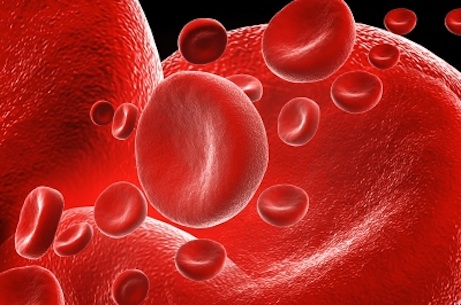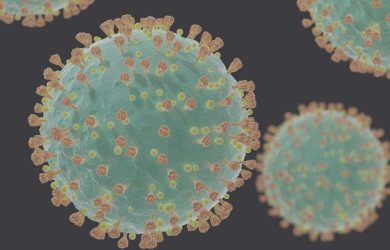
Anne Leone is researching the theme of blood and bleeding in Dante's literature.
Anne Leone‘s PhD is about the significance of blood in the work of Dante so it is ironic that her involvement in a vampire film society is completely unconnected with it.
“I was talking to my graduate tutor’s husband, the freelance writer and film critic Kevin Jackson. I was saying that I don’t sleep much and that everyone at Yale [where she was an undergraduate] called me a vampire,” she says. Jackson suggested that they set up a seminar together which would provide people with the opportunity to watch and discuss old, andsometimes forgotten or neglected, vampire films, which they did. As a complement to the film series, Anne and Kevin also invited a number of distinguished academics, writers and film critics who had published on the subject of vampires, including Sir Christopher Frayling and Kim Newman, to present public lectures on the topic. This was in the era of geeky vampire films, she says, before the advent of the Twilight series when vampires suddenly became trendy.
“It was not at all linked to my research,” says Anne [2006]. In connection with the seminar, which they called SVS (for The Sidney Sussex Vampire Society), Jackson started making a series of short films, which are on YouTube, written a vampire musical, for which Anne has recorded some tracks, and published a short cultural history of vampires called Bite. “The musical is very camp and funny,” says Anne.
The accidental link between her PhD subject and vampires is perhaps in keeping with Anne’s academic career to date, which has not followed a conventional route.
Anne is from an academic/artistic background. Her father is director of a political science institute, director of summer programmes and an English scholar at Colgate University; and her mother is a stained glass artist. She did her undergraduate degree at Yale in comparative literature with a focus on Italian, where she participated in an acapella group and a Slavic folk-music ensemble, and continued to play the violin. She was also involved in social justice movements with particular interest in drug policy and prison reform, and she interned at the ACLU: Drug Policy Litigation Project.
After that she worked for a year as a violin teacher and a freelance violinist. Then in 2004 she did an MPhil in European literature and culture at Cambridge. She says it was a last-minute application so there was no time to apply for funding. She was based at Selwyn College.
It took her a while to adjust to life in Cambridge so she didn’t apply in time for funding for a PhD. But later in her course she had “an amazing module” on Dante which really inspired her. She decided to do a PhD. Her supervisor encouraged her to work on an idea about the significance of blood in medieval culture and Dante’s work. Because she had missed the cut-off date for applying for a PhD she had to wait another year and spent a year doing odd jobs in the US.
In 2006 she began her PhD in Italian funded by a Gates scholarship. She moved to Sidney Sussex College. Like her involvement in the vampire film society, one might say that the subject of her PhD found her. While reading Dante’s Inferno Anne was intrigued by a passage where the poet describes blood and words “pouring forth” from a tree (in which the soul of a person who had committed suicide during his life is trapped). “I thought it was a grammatical error at first,” she says. “Dante was using the singular form of the worduscire(meaning to pour forth) instead of the plural form as if he was conflating blood and language. I was interested in this association between forms of expression and bleeding.”
She was encouraged to pursue the topic further by her supervisor and began to discover that blood in the Middle Ages suggested a number of connotations that might surprise the modern reader. For example, reproductive seed was thought to be a refined form of blood. So when reading a medieval text one might need to look beyond perhaps the most conventional way to interpret blood – as a symbol of violence – to something productive and creative: as the literal, physical substance that brings new life into the world. This basic idea helped to inform the main argument of her dissertation: that blood has a polysemous capacity in Dante’s works; it is not only a symbol of something (indeed, of many different things), but it is also a literal substance, which lies at the intersection between three major traditions in medieval culture — science (specifically anatomy and physiology), theology (Christianity, in Dante’s case), and literature (specifically the contemporary poetic tradition and the classical epic). For example, “when Dante describes blood’s role in the process of human reproduction, he follows contemporary scientific opinion on the topic almost to the letter (using not only Aristotle’s words but also even some of his similes), yet he manages at the same time to infuse these passages with a Christian message and with allusions to moments of bloody sacrifice in the classical epic tradition.” But Dante does not only draw on these traditions to inform his treatment of blood, he also uses blood and its associations with various traditions to express one of the central messages of his masterwork, the Commedia. Through this poem, Dante hopes to guide sinners towards salvation. Thus, we might not be so surprised that blood plays a central role in the work. After all, Dante is working within the Christian tradition where the route to salvation involves quite a lot of blood (one has only to think of the Eucharist and the Crucifixion), and which sees Christ as the Word.
She finished her PhD last July. She had hoped to do postdoctoral work on blood in medieval science and the visions of mystics. However, she didn’t get the funding she needed so she applied for other non-academic jobs, and worked in development for the Academy of Ancient Music in Cambridge for six months. The AAM has a historically focused approach to performing baroque and classical music.
Anne is a musician herself. She is lead singer in soul funk band the Chancellors of Vice and played violin in an 80s cover band for a while. She has been a classical violinist since age two.
She has just been offered a postdoc in Italian at the University of Notre Dame in the US and is excited to be returning to her original focus and to her home country. Although she was born in Canada, she grew up in a small village in upstate New York Her interest in Italian is linked to her family history. Her paternal grandparents are Italian and she says the family kept in close contact with their Italian relatives.
“I’m really excited to return to literature,” she says, adding that she will miss Cambridge. One of the reasons she has stayed so long is the large number of international students at the university, particularly on the Gates programme. “It’s so stimulating,” she says. “Especially if you come from a tiny town like I do.”
Picture credit: renjith krishnan and www.freedigitalphotos.net.












